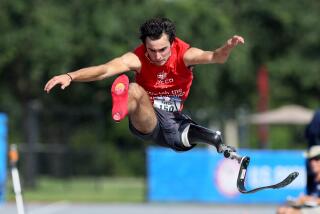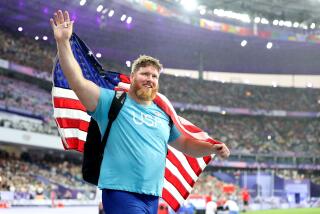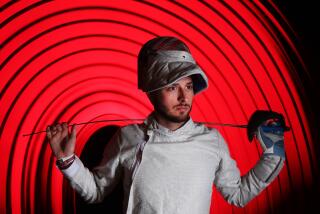Blutreich Will Take Olympic Shot at Discus
MISSION VIEJO — Every once in a while, Brian Blutreich looks up from his weightlifting, discus throwing and everything else that constitutes his life as an Olympic hopeful and glances out on the world of Joe Average.
Business suits and salaries. Working your way up, settling down. Safe, secure, predictable.
Blutreich, a former shotput and discus standout at Capistrano Valley High School and UCLA, can’t help but wonder about the 9-to-5 world, the one he has put off while following a dream.
“I’m 25,” he said, staring out the window of the Mission Viejo community recreation center where he works part time. “I’m at a point in my life where I have to make a move, get into a career, something. . . . I can’t go on like this forever.”
For the next four weeks, though, Blutreich will try to keep his current focus clear. The U.S. Olympic track and field trials are next month in New Orleans, and Blutreich, competing in the discus, aims to be among the top three who make the team.
The discus preliminaries are scheduled June 20; the finals June 22.
“Believe me,” he said. “Those dates are very vivid in my mind.”
As has been his longtime goal of making the Olympic team. In his senior year at Capistrano Valley, Blutreich--who set the current Orange County records for the discus (210 feet 8 inches) and shotput (69-6 1/2)--was touted as a thrower with tremendous potential.
Although he was a redshirt his first year at UCLA, he competed unattached, and was ranked No. 1 in the world in the shot for juniors (19 and under).
The next few years featured many highlights--and several setbacks, due to injuries. But Blutreich said, for him, the good times weren’t good enough.
“People say, ‘You won two Pac-10 titles, you were a six-time All-American, your team won two NCAA championships. . . . What are you complaining about?’ ” Blutreich said. “But you’ve got to understand, I didn’t progress the way I wanted to.”
He said he, and most of his younger teammates, refused to explore the easy way out of using performance-enhancing drugs such as anabolic steroids. Blutreich said in high school he hadn’t a clue about such things. And when he got to college, he just assumed he would naturally progress as rapidly as others.
“I was doing the same workouts as some of the older guys,” he said. “I was so ignorant. I figured, ‘Well, they’re four years older than me. That’s the way it is.’ But then I finally realized what was going on. You really don’t want to think people were (using performance-enhancing drugs).
“It’s so sad. A guy throws far and everybody’s reaction is, ‘Well, what’s he doing? What’s he taking?’ Some freak of nature might throw really far and everyone just assumes he’s using.”
Blutreich said his college highlight was winning the Pac-10 discus title his senior year. As the defending champion, Blutreich said the pressure was intense.
The meet was at Washington, which had on its roster Todd Wilson, Blutreich’s closest challenger. The weather was miserable--light drizzle and winds whipping through the discus area.
And although a sizable contingent of UCLA fans were on hand to support the team, Blutreich’s coach, Art Venegas, couldn’t make the trip. He had been hit in the head by a discus the previous week.
“It was (Wilson’s) home turf, the weather was bad, and my coach wasn’t there,” Blutreich said. “It was my senior year. The one thing I wanted to do was retain my title.”
Wilson got off a good throw--187-8--in the early rounds. Through five rounds, Blutreich couldn’t match it. On the sixth and final round, he stepped into the ring. And waited.
Unlike most who throw almost immediately, Blutreich stood in the ring, watching the infield flag so he could better judge the wind. Seconds before the two-minute time clock expired, the wind died. Blutreich spun and threw.
The discus landed just inside the foul line, on the opposite side of the stands. Unsure of the mark, the fans remained silent.
“The discus hits, and I hear nothing,” Blutreich said. “I’m totally depressed. Then (the officials) put the mark up on the board (188-10), and everyone (went) bananas. “
Wilson had one last throw, but it wasn’t good enough. Blutreich dropped to the ground and wept.
“I had never done anything like that before. I was speechless,” he said. “It was only a Pac-10 championship, but it was something I had been dreaming about all year. It was awesome.”
Blutreich hopes for a higher emotional high next month in New Orleans. He said that after defending national champion Anthony Washington, 1988 Olympian Mike Buncic and former U.S. champion Kamy Keshmiri, there are six or seven throwers--himself included--who can beat anyone on any given day.
“Odds are I will not make the team,” said Blutreich, ranked fifth in the nation last year with a career best of 202.
“But the weather (in New Orleans) is so unpredictable, you never know. The favorite at nationals last year (Keshmiri) got fourth. I figure the rest of us have just as good a chance as anyone.”
And if he doesn’t make the team?
Blutreich said some have advised him to stick with it, as his best years might still be ahead. That may be true, he said, but he will be 30 in 1996. And unlike sprinters, hurdlers and middle-distance runners, discus throwers, he said, aren’t able to make a dime--much less a living--from the sport.
Blutreich, who has a psychology degree from UCLA, says he might look into a job opportunities program that helps elite amateur athletes find work that allows for flexible schedules so they can also train and compete.
But he’s not going to make any career decisions, he says, until after the trials.
“I just basically want to compete well,” he says. “If I make it great. If not, fine. Emotionally, I know I can’t put all my eggs in one basket. I’ve seen people focus on only this. Like their whole life is the Olympics--or nothing. I’m not going to do that. I can’t.”
More to Read
Go beyond the scoreboard
Get the latest on L.A.'s teams in the daily Sports Report newsletter.
You may occasionally receive promotional content from the Los Angeles Times.






